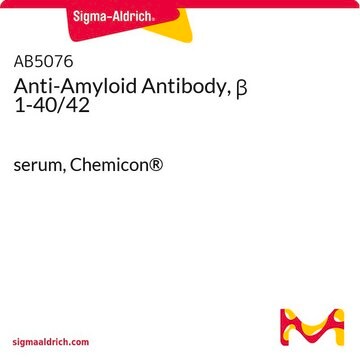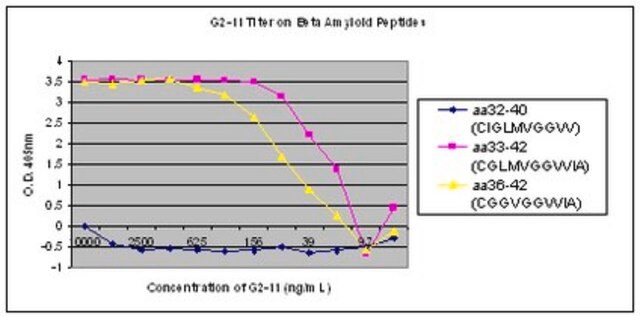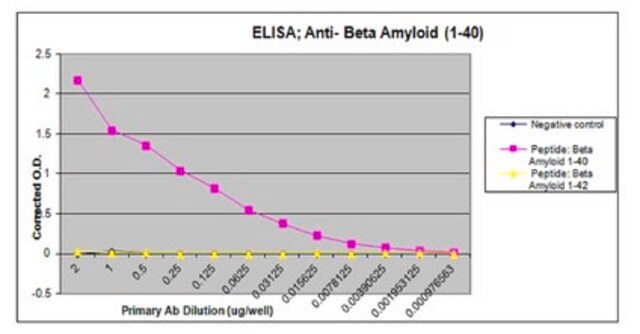General description
β-amyloid protein or aβ4 is derived from larger protein that belongs to the family of 70kDa transmembrane glycoproteins (amyloid precursor proteins, APP). These are produced in various isoforms by alternative splicing. APPs are synthesized by many tissues including brain cells. Abnormal β-amyloid protein deposits have been associated with Alzheimer′s disease, Down′s syndrome, Dutch-type amyloidosis and Lewy body dementia.
The antibody reacts specifically with β-amyloid protein. The epitope recognized by the antibody resides within amino acids 1-12 of the β-amyloid protein. It specifically stains amyloid plaques within the cortex and amyloid deposits in blood vessels using formic acid-treated, formalin-fixed, paraffin-embedded, and Methacarn-fixed sections of human Alzheimer′s disease (AD) brain tissue.
Specificity
Monoclonal Anti-β-Amyloid Protein reacts specifically with β-amyloid protein. The epitope recognized by the antibody resides within amino acid residues 1-12 of the β-amyloid protein. The antibody specifically stains amyloid plaques within the cortex, and amyloid deposits in blood vessels, in formic acid-treated, formalin-fixed, paraffin-embedded and Methacarn-fixed sections of human Alzheimer′s disease (AD) brain tissue.
Immunogen
Synthetic β-amyloid peptide, conjugated to KLH.
Application
Monoclonal Anti- β Amyloid Protein may be used for the localization of β -amyloid protein using various immunochemical assays such as ELISA, competitive ELISA and immunohistochemistry.
Mouse monoclonal anti-ABETA was used to treat old WT PDAPP mice with amyloid accumulation and learning deficits in an attempt to improve learning and decrease accumulation, however no response was observed.
The antibody is useful in immunohistochemistry, immunoblotting, ELISA, and competitive ELISA. Also, this antibody has been used to neutralize Aβ assemblies in brains of transgenic mice expressing a mutant form of amyloid precursor protein, and for in vivo deep tissue imaging using near-IR optical spectrum.
Biochem/physiol Actions
β-amyloid fragments are amyloidogenic and neurotoxic both in vitro and in vivo. The presence of a large number of neuritic (senile) plaques and neurofibrillary tangles in the cerebral cortex is used as a pathological marker for a disease state and presents the major criterion for the diagnosis of Alzheimer′s disease at autopsy. A monoclonal antibody reacting specifically with β-amyloid protein is valuable for studying the nature of the β-amyloid protein by enabling detection and localization of β-amyloid protein and fragments.
Physical form
Monoclonal Anti-β-Amyloid Protein is provided as ascites fluid with 15mM sodium azide as a preservative.
Storage and Stability
For continuous use, store at 2-8 °C for no more than one month. For extended storage, freeze in working aliquots. Repeated freezing and thawing is not recommended. Storage in "frost-free" freezers is not recommended. If slight turbidity occurs upon prolonged storage, clarify the solution by centrifugation before use.
Disclaimer
Unless otherwise stated in our catalog or other company documentation accompanying the product(s), our products are intended for research use only and are not to be used for any other purpose, which includes but is not limited to, unauthorized commercial uses, in vitro diagnostic uses, ex vivo or in vivo therapeutic uses or any type of consumption or application to humans or animals.









